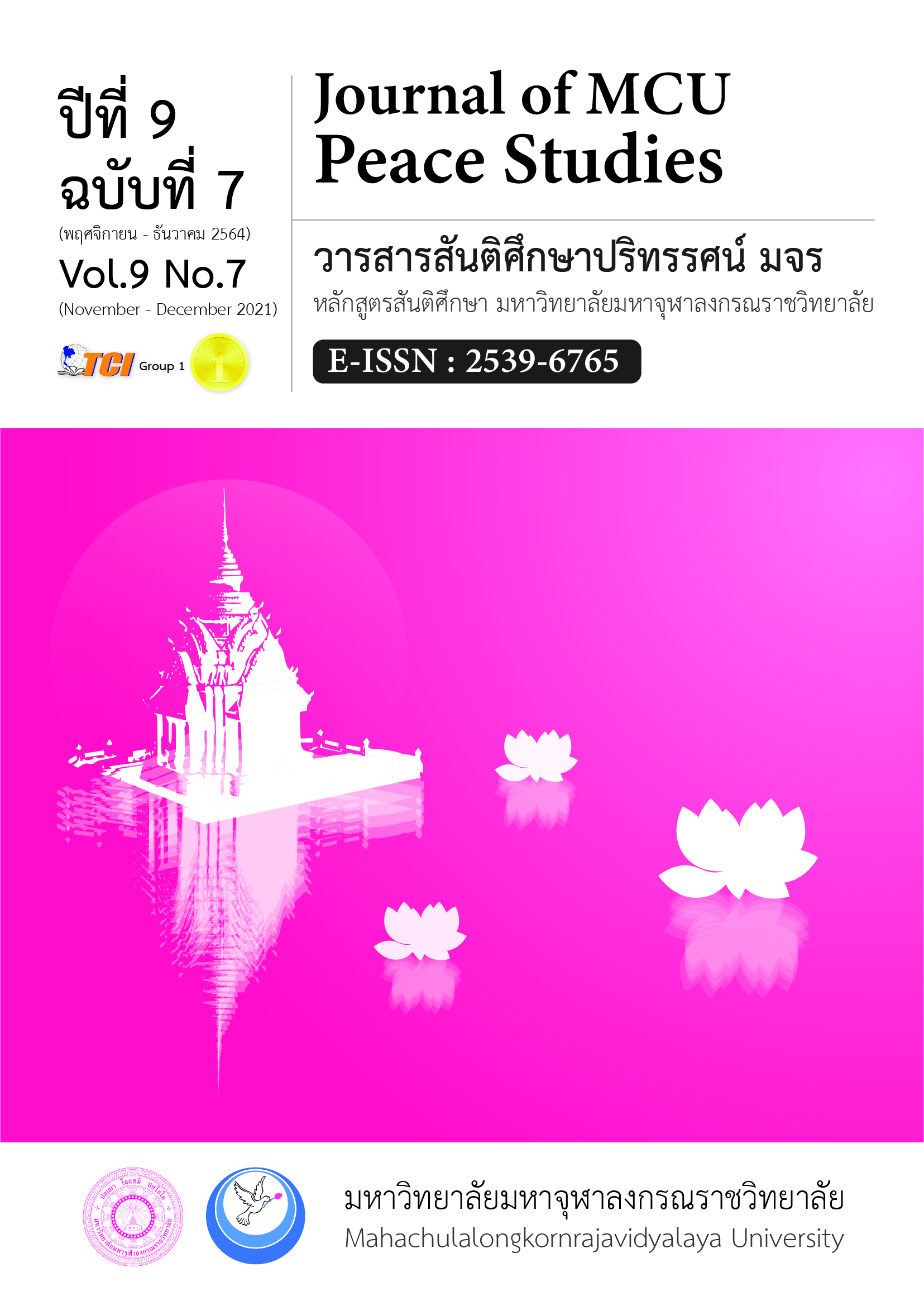รูปแบบการจัดการความรู้ของผู้บริหารโรงเรียนยุคใหม่ เพื่อพัฒนาคุณภาพการศึกษาในโรงเรียนพระปริยัติธรรมแผนกสามัญศึกษา
Main Article Content
บทคัดย่อ
บทความวิจัยนี้มีวัตถุประสงค์ ดังนี้ คือ 1) เพื่อศึกษาสภาพปัจจุบันและปัญหา 2) เพื่อสร้างรูปแบบ 3) เพื่อทดลองรูปแบบ และ 4) เพื่อประเมินรูปแบบ เป็นการวิจัยแบบผสมผสาน โดยการวิจัยมี 4 ขั้นตอน ดังนี้ 1. ศึกษาสภาพปัจจุบันและปัญหา กลุ่มตัวอย่างได้แก่ ผู้บริหาร และครูโรงเรียนพระปริยัติธรรมแผนกสามัญศึกษา 134 แห่ง โดยการสุ่มอย่างง่าย 2. สร้างรูปแบบ ตรวจสอบรูปแบบโดยผู้ทรงคุณวุฒิและผู้เชี่ยวชาญ 11 คน 3. ทดลองรูปแบบ กลุ่มเป้าหมายคือสถานศึกษา 1 แห่ง และ 4. การประเมินรูปแบบ กลุ่มเป้าหมายคือ ผู้บริหาร ครู ผู้มีส่วนเกี่ยวข้อง 21 คน เครื่องมือที่ใช้ได้แก่ แบบสอบถาม แบบสัมภาษณ์กึ่งโครงสร้าง และแบบประเมิน สถิติที่ใช้ได้แก่ ร้อยละ ค่าเฉลี่ย ส่วนเบี่ยงเบนมาตรฐาน และการวิเคราะห์เนื้อหา ผลการวิจัยพบว่า รูปแบบการจัดการความรู้ มี 5 องค์ประกอบ ดังนี้ 1. หลักการ ได้แก่ 1) หลักการเรียนรู้ตลอดชีวิต 2) หลักการบริหารการเปลี่ยนแปลง 3) หลักการมีส่วนร่วม 4) หลักการแลกเปลี่ยนเรียนรู้ร่วมกัน 2. วัตถุประสงค์ ได้แก่ 1) ให้ผู้บริหาร ครู นำแนวทางการจัดการความรู้ยุคใหม่ไปใช้ 2) ให้สถานศึกษานำวิถีการเรียนรู้แนวใหม่ไปประยุกต์ใช้ 3. วิธีดำเนินการ ได้แก่ 1) การกำหนดความรู้ 2) การแสวงหาความรู้ 3) การจัดการความรู้ให้เป็นระบบ 4) การประมวลและกลั่นกรองความรู้ 5) การเข้าถึงความรู้ 6) การแลกเปลี่ยนความรู้ 7) การเรียนรู้ โดยมีองค์ประกอบย่อย 3 ด้าน คือ 1) ด้านการสร้างความร่วมมือ 2) ด้านการสื่อสาร 3) ด้านการใช้เทคโนโลยีดิจิทัล 4. แนวทางการประเมิน ได้แก่ 1) ประเมินความสำเร็จ 2) ประเมินความพึงพอใจ 5. เงื่อนไขความสำเร็จ ได้แก่ 1) มีความตระหนักและเห็นความสำคัญของการพัฒนาความรู้ 2) เป็นบุคคลแห่งการเรียนรู้ มีส่วนร่วม มีความมุ่งมั่นและตั้งใจอย่างแท้จริงในการจัดการความรู้ให้มีคุณภาพมากขึ้น
Article Details

อนุญาตภายใต้เงื่อนไข Creative Commons Attribution-NonCommercial-NoDerivatives 4.0 International License.
ทัศนะและความคิดเห็นที่ปรากฏในบทความในวารสาร ถือเป็นความรับผิดชอบของผู้เขียนบทความนั้น และไม่ถือเป็นทัศนะและความรับผิดชอบของกองบรรณาธิการ ยินยอมว่าบทความเป็นลิขสิทธิ์ของวารสาร
เอกสารอ้างอิง
Alan, F. (2010). Knowledge Management-tools. Retrieved October 19, 2020, from http://www.knowledge-management-tools.net/.
Cerchione, R., & Esposito, E. (2017). Using knowledge management systems: A taxonomy of SME strategies, International Journal of Information Management, journal home page. Retrieved October 19, 2020, from https://www.journals.elsevier.com/internationaljournal-of-information-management.
Chakphithak, N. (2016). Knowledge management theory. Bangkok: Odeon Store.
Eisner, E. (1976). Education Connoisseurship and Criticism: Their Form and Functions in Educational Evaluation. The Journal of Aesthetic Education, 10(3/4), 135-150.
Janyaphaiboon, S. (2012). Model of Quality Assurance Development in Educational Institutions under Secondary Education Service Area Office District 29. (Doctoral Dissertation). Ubon Ratchathani Rajabhat Institute. Ubon Ratchathani.
Knowledge Management and Development Office: Public Organization. (2016). Handbook and Modern Management Techniques in accordance with Good Country Management Guidelines. Nonthaburi: Sahamit Printing.
Kongsawatkiat, K. (2010). Documents for lectures Knowledge management. (3rd ed). Bangkok: Ratanatri.
Phosri,P., & Werapanyo,P. (2018). The Educational Administration in the 21st Century. Journal of Educational Review Faculty of Education in MCU, 4(1), 80-91.
Meesri, N., & Tawata, A. (2018). The Relationship Between Knowledge Management and Creativity of Support Employees Silpakorn University. Veridian E-Journal Silpakorn University, 11(2), 21-34.
Ministry of Education, Office of the Education Council. (2016). Thai Educational Conditions 2016/2017: Thailand's Education Reform Guidelines for Thailand 4.0 Era. Bangkok: Prigwarn Graphics Co., Ltd.
Naipinit, A. et al. (2014). AdT justment Under Globalization. Academic Journal of Songkhla Rajabhat University, 7(1), 1-12.
Namprasertchai, S. (2015). Knowledge Management. Bangkok: SE-EDUCATION. Office for Accreditation and Quality Assessment. (2011). Criteria and methods of external quality assessment of basic education institutions. Bangkok: Offset Plus Co., Ltd.
Office of the Basic Education Commission, (2017). Driving Thai Secondary Education 4.0 for Work in the 21st Century. Bangkok: Agricultural Cooperative Society of Thailand Co., Ltd.
Panich, W. (2005). Knowledge management and Thai public administration. Retrieved April 15, 2019, from. http://www.person.ku.ac.th/training/kukm/article/1097206195-1.pdf.
Panich, W. (2016). Building Learning for the 21st Century. (2rd ed). Bangkok: S. Charoen Printing.
Phasukjeet, P. (2007). Knowledge Management: Driven edition. (3rd ed). Bangkok: Yaimai.
Phophakdee, P. (2010). Development of a juristic school management model: Under the Office of the Basic Education Commission. (Doctoral Dissertation). Chulalongkorn University. Bangkok.
Senge, P. (2006). The leader’s new work: Building learning organizations. Retrieved October 19, 2020, from https://www.taylorfrancis.com/books/edit/10.4324/9781315250601/leadership-perspectives-alan-hooper.
Sukhakul, P. (2004). Personnel administration of Phrapariyattidham School: Department of General Education under the National Office of Buddhism School Group 2. Retrieved October 19, 2020, from http://www.thaithesis.org/detail.php?id=1162547000355.


